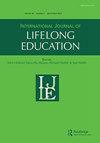在不确定的过渡时期加强高等教育中的可持续终身学习:越南大学生策略的混合方法调查
IF 1.9
Q2 EDUCATION & EDUCATIONAL RESEARCH
引用次数: 1
摘要
摘要全球范围内发生了重大逆境,包括新冠肺炎疫情,它对社会的各个方面产生了影响,如就业和教育领域。大学生应该具备适应和抵御就业挑战所需的技能、知识和态度。本研究采用三角测量混合方法来衡量和探索中学后学生的可持续终身学习,以达到面向未来的目的。本研究从量化阶段开始,考察四种自主学习策略与终身学习之间的关系。采用调查方法对越南152名大学生进行了研究。结构方程模型的结果表明,终身学习能力与元认知知识、资源管理和激励信念之间存在显著的正相关。然而,认知参与并没有揭示出显著的联系。其次,对五名本科生进行的定性跟踪研究表明,学生对未来的策略(自主学习策略)和心理准备(自我理解、适应性和灵活性)的使用情况。对于高等教育中的教师和学生来说,促进和提高学生的终身学习能力以应对过渡前的不确定性具有重要意义。本文章由计算机程序翻译,如有差异,请以英文原文为准。
Enhancing sustainable lifelong learning in higher education for uncertain transitions: a mixed method investigation into Vietnamese undergraduates’ strategies
ABSTRACT Globally significant adversities have occurred, including the COVID−19 pandemic, which had an impact on all facets of society, such as the fields of employment and education. University students should be well-equipped with the skills, knowledge, and attitude required to adapt to and withstand employability challenges. A triangulation mixed-method approach was utilised in this study to measure and explore post-secondary students’ sustainable lifelong learning for future-oriented purposes. The study began with a quantitative phase to examine the relationship between the four self-regulated learning strategies and lifelong learning. A survey approach was utilised to execute the research among 152 university students in Vietnam. The results of structural equation modelling demonstrated a significant positive association between lifelong learning abilities and metacognitive knowledge, resource management, and motivating beliefs. Cognitive involvement, however, did not reveal a significant connection. Second, qualitative follow-up research with five undergraduates indicated students’ use of strategical (self-regulated learning strategies) and psychological preparation (self-understanding, adaptability, and flexibility) for the future. Significant implications were made for teachers and students in higher education to facilitate and enhance students’ lifelong learning abilities to cope with uncertainties prior to transitions.
求助全文
通过发布文献求助,成功后即可免费获取论文全文。
去求助
来源期刊

International Journal of Lifelong Education
EDUCATION & EDUCATIONAL RESEARCH-
CiteScore
3.10
自引率
27.80%
发文量
40
期刊介绍:
The International Journal of Lifelong Education provides a forum for debate on the principles and practice of lifelong, adult, continuing, recurrent and initial education and learning, whether in formal, institutional or informal settings. Common themes include social purpose in lifelong education, and sociological, policy and political studies of lifelong education. The journal recognises that research into lifelong learning needs to focus on the relationships between schooling, later learning, active citizenship and personal fulfilment, as well as the relationship between schooling, employability and economic development.
 求助内容:
求助内容: 应助结果提醒方式:
应助结果提醒方式:


